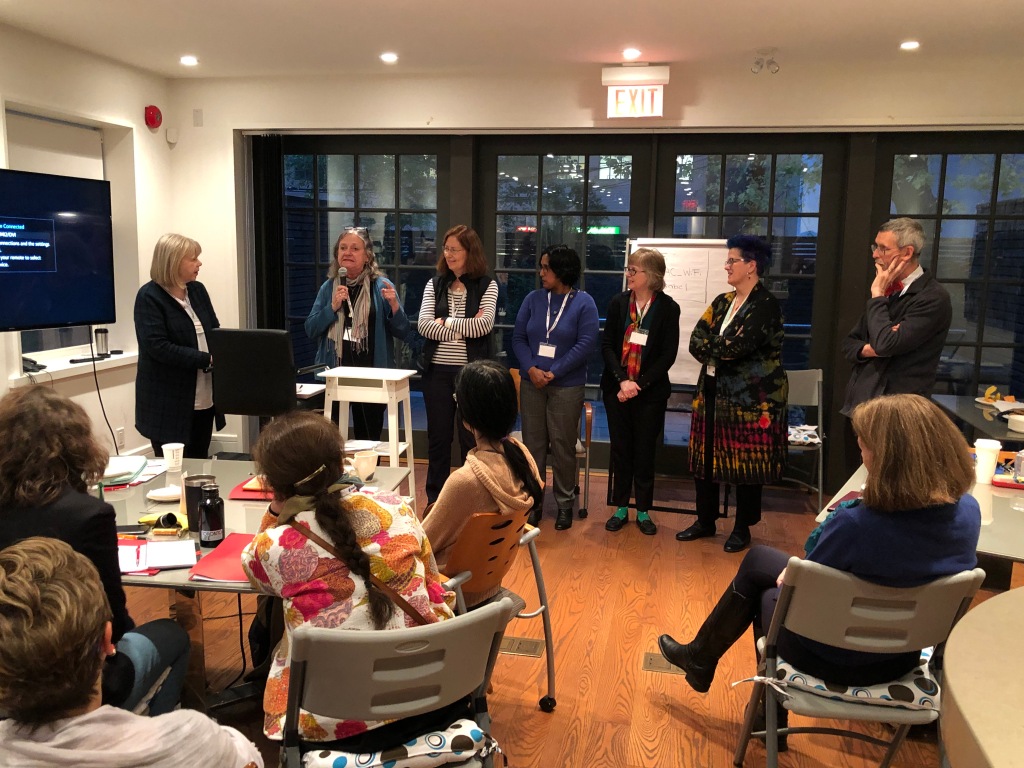by Michelle Waitzman

Editors sometimes have fun sharing—and inventing—collective nouns for various groups of creatures or people. When it comes to editors themselves, I propose to call the group “a generosity of editors.” When they gather in large (or even modest) numbers, editors are exceedingly generous with their knowledge, experience and wisdom. I was reminded of this recently when I attended the second annual Toronto mini-conference presented by the UK-based Society for Editors and Proofreaders (SfEP) and organized by Maya Berger, Kelly Lamb, Janet MacMillan, and Rachel Small. Their first generous act was allowing non-members to attend an event with very limited space, and even providing a discount for Editors Canada members. This type of cross-association cooperation is becoming the norm, and it benefits editors around the world.
The day consisted of five sessions featuring presenters from the UK, the US, and Canada. (The previous day, an editor and business coach from Australia, Malini Devadas, gave a pre-conference workshop aimed at freelance editors.) The topics covered were diverse, but a theme of “working smarter” connected many of them. This theme demonstrated that learning how to edit well is only the first step to becoming a successful editor. Editing skills can be enhanced by learning how to work efficiently, provide more consistent results to clients, and collaborate effectively with other publishing professionals.
The day began with a session by well-known macros expert Paul Beverley. Paul’s generosity is legendary. He has created almost 700 editing-related macros, and he makes them all available free of charge. In addition, he has over 100 videos posted on his YouTube channel to help people learn to use his macros. Paul introduced conference participants to the concept of macros and how they can help editors work faster and improve error detection. He demonstrated how some of his most popular macros can analyze texts for inconsistencies, execute a long list of global find-and-replace instructions all at once, or quickly correct common errors as the editor encounters them. He remained at the venue for the rest of the day to answer questions, with a laptop set up for demonstrations.
Veteran fiction editor Jennifer Glossop, who has worked with some of Canada’s top authors (she edited Margaret Atwood’s The Handmaid’s Tale), shared wisdom and insight in her presentation on finding the missing parts in a narrative. Jennifer pointed out an interesting dilemma that editors face: We are generally good at identifying what should be cut, but it can be much more difficult to figure out what’s missing. A good editor can help identify those important details that may be fully formed in the author’s mind but did not make it onto the page. Her experience was evident, and even editors who don’t work in fiction (like me) were able to take away useful advice on how to give readers a more satisfying experience.
Erin Brenner is known for her practical sessions on copy editing. Her session focused on how to do the best job possible when there isn’t enough time to be thorough. Erin stressed the value of being prepared so you don’t waste time when a rush edit comes in. Familiarity with the client’s house style and other requirements can speed things up. Tools like checklists, macros, and a set of notes on the client’s preferences can reduce the number of corrections needed after the first round of editing. But even a well-prepared editor can’t meet an impossible deadline. If there’s more work than time, Erin recommends triage for the project: Set out the top priorities for the client and be prepared to let some of the less important steps go.
Indexer Heather Ebbs presented “An editor’s guide to indexes.” She used her knowledge as both an editor and an indexer (and indexing instructor) to outline the process of working with an indexer, and how to get the best results. She warned that good indexers are often booked for several months, so editors shouldn’t wait until editing is complete to contact an indexer. Heather gave attendees an overview of how indexers work, what information they need from the editor, what indexing software does (and doesn’t do), and what a professional indexer adds to the value of a book. It was a very practical session for any editor who works on books that need to be (or should be) indexed. Conference participants were fortunate to learn from her, since Heather is retiring and will no longer give presentations.
Copy editor and proofreader Amy J. Schneider demonstrated how editors can use Word templates to customize the way they work on documents. She shared her own process with the attendees step by step, from receiving a manuscript in the publisher’s templated style, to creating a template that makes the text easier to work with, opening the manuscript using the editor’s template, and then reverting the edited manuscript back to its original style before returning it to the client. She showed us how to adjust style attributes to make it easier to read the text, to navigate through it, and to identify different manuscript elements. Her session was most applicable to editors who work regularly with the same clients, since they are likely to use the same style across their manuscripts.
The mini-conference concluded with a Q&A session featuring all the presenters, including Malini Devadas from the pre-conference workshop. Their generosity didn’t end there, however, since almost everyone continued sharing ideas, experience, and support over a meal and drinks at a pub across the road.
Michelle Waitzman is a freelance non-fiction writer, editor, and proofreader in Toronto. Before she started editing, Michelle survived careers in TV production and corporate communications. Between these, she ran away to live in New Zealand for seven years.
This article was copy edited by Leslie Lapides.
